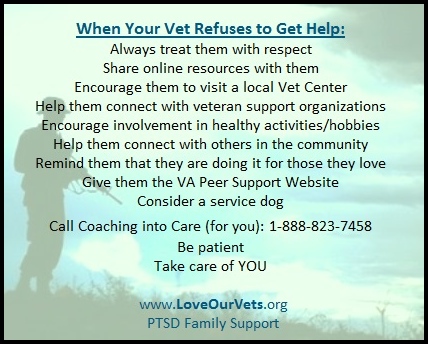I heard recently that over 50% of our veterans with PTSD are NOT getting help! Sometimes it takes months, years and even decades for our vets (or other loved ones) to realize they have PTSD. Many times it is the loved ones around them who see it so clearly day after day, and hopefully eventually the vets themselves take those first brave steps to reach out for a helping hand. But what if our vet has Posttraumatic Stress but denies it (often vehemently)? Or what if they know they have it but refuse to do anything about it, or are fearful of what might happen if they do? What if they just brush it off, or numb themselves with addictive substances, or our greatest fear – attempt suicide?
As loved ones and caregivers, we want the very best for them. And we want to enjoy life ourselves too (nothing wrong with admitting that!). Those of us whose vets have taken steps toward overcoming the fallout of their trauma are truly grateful, and proud of them. But what about those whose vets with PTSD (whether officially diagnosed or not) refuse to get help? Is there a magic button to push… or a secret pill we can just slip into their coffee? (If there is, Google does not know.)
In the absence of simple solutions, there are at least a few things to consider that might be just what they need to help them take that ominous first step. And let’s remember that whether they respond or not, they always deserve our utmost respect. If they are on the internet, there is a wealth of website information, online support groups, and Facebook pages just for them. Safe, not intimidating. Surrounded by others who know and understand.
Then, is there a VA or Vet Center near you? Sometimes the Vet Centers can offer a more non-threatening atmosphere…encourage them to just drop in and see it. Or call. No pressure. Or if there is a friend or family member who will go with them, that would be great!
There are several organizations who provide peer support groups and /or peer support activities. Often a veteran plagued with PTSD would never darken the door of the VA, but he might consider going hunting with other vets. Or fishing. There the connection is made for further recovery. The VA also has a website devoted solely to veteran peer support.
Another option is to see if they would be willing to talk on the phone with someone. We have some phone numbers listed on the Love Our Vets website also.
Some people respond well to incentives. Would they be willing to drop in to a Vet Center or go to counseling with you in exchange for ____? I suppose short of nagging (don’t do that) it can’t hurt to try. And one vet shared that the thing that gave him the push he needed was the possibility of financial compensation through the VA. Help them understand that they are not a charity case, but that they have EARNED the compensation.
It is also crucial that they not withdraw totally. Even if they never reach out for help, they do need to stay active. What hobbies do they have? Are they getting exercise? Do they have any helpful friends? Have they considered community or church involvement? Also, those with PTSD often find it beneficial to volunteer where there is a need.
How about a service dog? Many people with PTSD find tremendous help and comfort with a professionally trained service dog. Ask your local VA for information about that, or you could also contact Battle Buddy.
Often family interventions have proven to be successful. The key to those as I understand it is love. Imagine that! As I remind us in Love Our Vets: Restoring Hope for Families of Veterans with PTSD, we cannot fix them, but we CAN love them! And that love goes a very long way.
One more thing that just might help nudge them across the line is to remind them of their main motivation: they are doing it not only for themselves, but for those they love.
Finally, another helpful resource through the VA: Coaching Into Care 1-888-823-7458. This program provides a “coaching” service for family and friends of veterans who see that their veteran needs help. Coaching involves helping the caller figure out how to motivate their veteran to seek services. The service is free and provided by licensed clinical social workers and psychologists. The goal of the service is to help the veteran and family members find the appropriate services in their community.
The other thing we can do – and must do – is to let go. Realize we cannot force them. We do not have the power. HARD TO DO! But rather than just let go and be empty, fill that vacuum with taking good care of us. We do not stop living even if they do.
Whether or not our vets take healthy steps to do what they need, we can.
And let’s not wait until they start getting better before we do.
Here is a good place for YOU to start. The Caregivers program through the VA. Worth checking out.
One wife shared that it took ten very long years for her vet to go for help. And they are doing really well now! So be patient. Take care of YOU. And do all you can to encourage them. What can you do today to be good to yourself? That is a terrific place to start.
Love Our Vets – PTSD Family Support, LLC on Facebook







